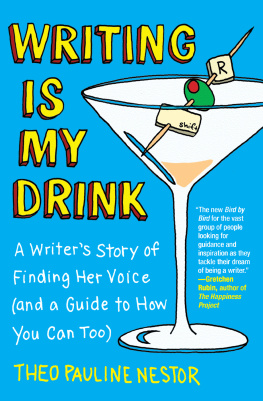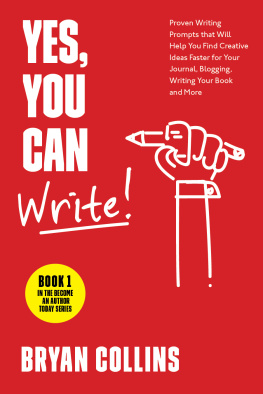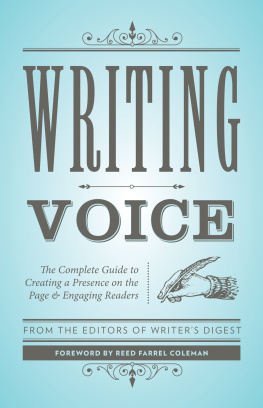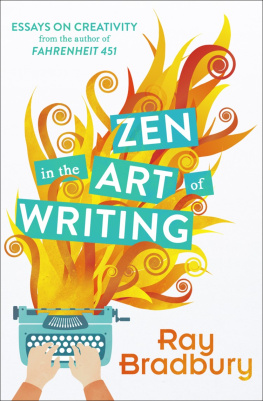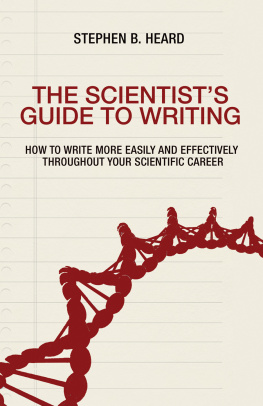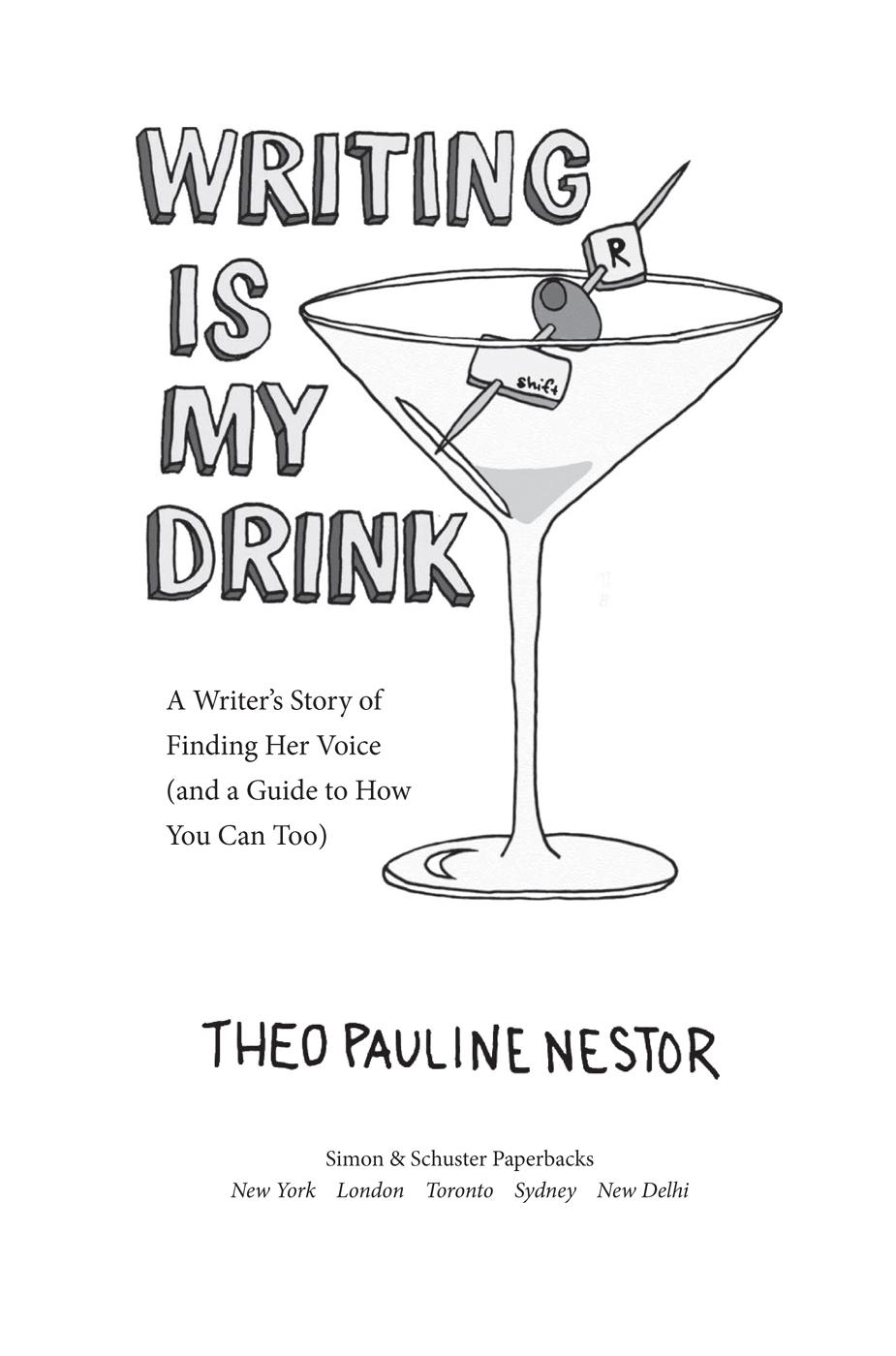Additional Praise for
WRITING IS MY DRINK
For those feeling overwhelmed or battered by writers block or self-doubt, this book is a magic carpet ride out of that muck and into wide-open, soul-connected creative flow, uncannily engaging for people who generally cant abide writing guides. And Nestor is a quietly captivating, intimate, healing storytellerthe best and rarest kind.
Candace Walsh, author of Licking the Spoon: A Memoir of Food, Family, and Identity
This is a book to savor, each delicious and thoroughly entertaining chapter revealing not just more of Theos brilliance, but your own as well. For all those yearning to discover your own creative and unique inner literary genius, look no further. Youve come home.
Katherine Woodward Thomas, bestselling author of Calling In The One
Praise for
HOW TO SLEEP ALONE IN A KING-SIZE BED: A MEMOIR OF STARTING OVER
Nestor has a big heart, a real feeling for the pain and craziness of human life.
Frank McCourt, Pulitzer Prizewinning author of Angelas Ashes
Theo Nestor has an uncommon ability to evoke common yet very intense emotions. How to Sleep Alone in a King-Size Bed is smart, astringent, funny, precise, candid, and possesses not an ounce of self-pity.
David Shields, New York Times bestselling author of The Thing About Life Is That One Day Youll Be Dead
Heartbreakingly honest, wryly funny, and revelatory... [Nestors] clever and relatable prose makes her tale endearing and insightful, and she sidesteps the clichs of a woman wounded with bittersweet honesty.
LadiesHomeJournal.com
A divorced mothers funny, chatty, revealing take on Splitsvillewith just enough anguish and sadness to be utterly believable... An unexpected treat here is a vivid portrait of the authors thrice-married, utterly nonmaternal but generous mother... Women going through the pain and turmoil of separation and divorce will appreciate Nestors candor and wit. Not another slick how-to, but a comforting reminder that life goes on after the spouse is gone.
Kirkus Reviews
Nestor writes with a self-possession and gentleness that is arrestingoffering sentiment, without sentimentality.
Seattle Magazine
Thank you for downloading this Simon & Schuster eBook.
Join our mailing list and get updates on new releases, deals, bonus content and other great books from Simon & Schuster.
C LICK H ERE T O S IGN U P
or visit us online to sign up at
eBookNews.SimonandSchuster.com
Contents
For my daughters
Sometimes you have to play a long time to be able to play like yourself.
M ILES D AVIS
Introduction
Two competing forces have dominated my life: a great need to please others and an equally powerful desire for expression, a tumbleweed that has grown in mass and velocity with the passing years. Now that Im a writer and a writing teacher, I can safely say that expression will prevail, but the imprint of the small girl who tried to make herself smaller still shimmers within me, reminding me of the long way Ive come to find my own voice and to trust it.
When I was seven, my mother and I attended a horse show in which a family we knew had a couple of horses. The Wilsons were a family of accomplished children and prizewinning horses, a family together enough to obtain quilted covers for their blender and toaster. They provided a vivid contrast to my single-mom family with siblings scattered. My mother never said, I need their approval, but even as a kid I could feel itin her eagerness to speak, her laugh, her carefully applied pink lipstick.
After the show, horses promenaded between track and stables. I remember the satiny ribbons of blue and red and white. I loved the order of it: first place, second place, third. It was a hot California day in the mid-1960s, the hills parched yellow except for the dark green spots where old oaks offered circles of shade. I stood between my mother and one of the Wilsons horses, taking in the all-knowing horse eye, its crazy straight eyelashes, the fly on the nose tolerated for only a second. And then the horse shuffled its hooves a bit and one hoof pressed silently onto my foot. Pain shot through me. I wanted to scream, but my mother was talking to Mrs. Wilson, and Id been taught never to interrupt. Good manners were integral to my identity; more than once, Id imagined a chance to curtsyusually a fluke meeting with a queen or a Kennedy. My mother was talking very quickly, and there didnt even seem to be a quick inhale of breath in which I could wedge my voice. Finally, the pain was intolerable, and I spokevery quietlythe line that would soon become legend: Excuse me, the horse is on my foot.
A moment later the horse was shooed off my foot and the incident was over, but the story of my passivity lived on and has been retold so many times that it has become an emblem of my childhood selfa sort of calling card for the younger me, the timid girl too afraid to speak up when needed, or to risk the displeasure of others even at the cost of her own welfare. I cringe during the retelling of this story, which my mother tells without malicious intent and with great affection. When she gets to the Excuse me part she uses the smallest of voices, unaware that my silence had once been a boilerplate item in the unspoken contract between us.
I dont mind telling this story today, though, because I now am telling it in my own voice. Its not a funny story when I tell it. Excuse me is no longer the punch line. The heat, the yellow hills, the fly, theyre all mine. When I tell the story myself, in my own voice, I understand why the young me did not speak up sooner and I forgive her for it. Forgiving her has become an essential part of uncovering my own voice. My uncovery.
Like many kids who grew up in the blue cloud of the 1960s, I spent the bulk of my childhood feeling like I had to be good. I didnt come up with this on my own. Being good paid off. During the years when I was often told that I was a good girl, one of my difficult sisters lived in a convent in Mexico and another sibling with a wild side vanished to do a stint in a school for wayward girls in the belly of Texas. In my childs mind, everything dear to meincluding the love of others and my own survivaldepended on being good.
What did being good look like? Besides shiny patent leather Mary Janes and Shirley Temple manners, being good often meant not talking about what was really happening. The argument that erupted downstairs after you were supposed to be asleep, mothers afternoon nap, the inviolability of the five p.m. happy hourall of these single events cluster together, and the cluster has a name: alcoholism.
But if you dont have access to that name and if you dont talk or think about these things for long enough, you might find that you actually have no idea what you think. At least, thats what happened to me.
Writing has been part of my recovery from being good, silent, and in denial. All of these were so much a part of who I was that I have had to keep coming back to the pageto writingto remind myself that I, too, possess a version of things, a take on the world. Not the take. A take. Mine. The page is where I am free at last from the isolation of unarticulated life, where expression takes the place of silence.
A long time before I wrote regularly and a very long time before I was published, I knew there was a writer inside me. Occasionally words would tumble onto the page in a rush and startle me with their rawness and vitality. Uncut gems tossed suddenly from a velvet bag, they magnetized me. More often than not, though, I was avoiding writing, or writing so rarely that I could never keep track of the thread of a piece. But in those rare moments of writing with abandon, I did recognize my own voice.
Next page
